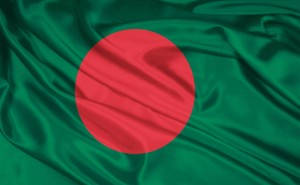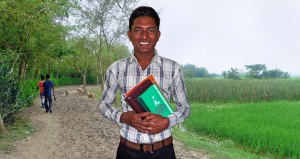Bangladesh (MNN) — FMI’s Bruce Allen recently reported that the Bangladeshi government has indirectly shut down 200 operating Christian NGOs since the Foreign Donations (Voluntary Activities) Regulation Bill, 2016 (FDRB) was passed into law October 2016.
FDRB Cause and Effects

Bangladesh flag (Graphic courtesy of FMI)
Thankfully, FMI and its partners have not been affected by the FDRB and remain functioning as normal. However, the crackdown on NGOs comes in response to Bangladesh’s major terrorist attack last year.
At the beginning of last month, the country marked its first anniversary since the Holey Artisan Bakery and Café in Dhaka was attacked by Islamic extremists. At least 20 people were murdered in the tragedy, including foreigners.
Despite a previous increase in terrorist activity, this strike was the first major terrorist attack Bangladesh had experienced in years. Nevertheless, it was a ringing gong that awoke the country to the dangers within its borders.
And what many may not realize is that funding for terrorist activities was once able to enter Bangladesh under the disguise of foreign aid. To counter this elusive funding scheme, Bangladesh’s government has made it harder for NGOs in the country, particularly religious ones, to receive foreign aid.
Now, under the FDRB, in order for an NGO to receive foreign funds and perform activities, NGOs much register with NGO Affairs Bureau (NGOAB). What the FDRB essentially does is it gives the NGOAB the ability to decide which NGOs can receive funding or not.
NGOs and the NGOAB
While the NGOAB does have a list of requirements and/or violations that can either grant or cancel an NGO’s ability to register with the NGOAB, one of the most influential of these is the fact that NGOs cannot “[make] derogatory comments about the Constitution and constitutional institutions’ of Bangladesh, including the Offices of the President, the Prime Minister, the Parliament, or the Supreme Court…” according to the Library of Congress.
The ambiguous “derogatory comments” give leeway for the NGOAB to decide which NGOs’ registrations can be canceled, even without seemingly hard and incriminating evidence. However, according to FMI’s Bruce Allen, there seems to be an approval sweet-spot for certain types of religious NGOs.
“If you’re an organization, even if you’re a Christian mission agency or NGO, providing non-religious services such as a hospital or relief work [and] things like that, and your services are available to anyone in Bangladesh, then you’re able to continue to operate in Bangladesh,” Allen shares.
“So what they were really clamping down on was just overt religious activity, so things that were geared specifically for the Christian community.”
In other words, it is mainly NGOs with foreigners living in Bangladesh such as field missionaries who have been denied the ability work in the country. But if NGOs are overall improving the lives of Bangladeshis, chances are they will be able to continue their work. Still, it’s questionable if the FDRB is a good move for Bangladesh.
Since the café attack, tourism in the country has dropped significantly. Bangladesh is a poor country and losing NGOs coupled with a decline in the tourism income may create even worse financial conditions.
“It’s a shame that these organizations that wanted to help the people of Bangladesh are now being prevented from doing that,” Allen says.
Support Bangladesh’s Christians

A Bangladeshi pastor poses for a portrait. (Photo courtesy of FMI)
However, since FMI does not send people to Bangladesh to work, the ministry is still a viable choice for people looking to help and support Bangladeshi Christians and Gospel work in the country.
FMI deals directly and exclusively with national church planters. Not to mention, because the ministry is not widely known, it tends to fly under the government’s radar.
So will you pray? Pray for creativity and integrity for FMI-supported church planters and pastors in Bangladesh who continue to share the Gospel, despite the restrictions and regulations the Bangladeshi government may implement.
Also, pray that Bangladesh’s government would continue to allow FMI’s work in the country and for the Gospel’s impact to continue growing.
And for just $120 a month, a church planter can be supported with a supplemental income for ongoing Bible training, emergency medical expenses, and the ability to do full-time evangelism and discipleship. Will you consider supporting a church planter to help share God’s word in Bangladesh?
To donate and/or support a church planter, click here!
For more information on FMI’s work in Bangladesh, click here!
